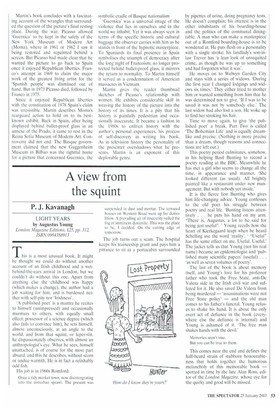A view from the squint
P. J. Kavanagh
LIGHT YEARS by Augustus Young London Magazine Editions, £25, pp. 312, ISBN 0904388913 This is a most unusual book. It might be thought we could do without another account of an Irish childhood and a wetbehind-the-ears arrival in London, hut we couldn't do without this one. Apart from anything else the childhood was happy (which makes a change), the author had a job waiting for him, and is burdened neither with self-pity nor `Irishness'.
'A published poet' is a mantra he recites to himself (unimpressed) and occasionally murmurs to others, with equally small effect; possessor of a science degree (which also fails to convince him), he sets himself, almost unconsciously, at an angle to the world, and from that squint, or leper-slit, he dispassionately observes, with almost an anthropologist's eye. What he sees, himself unattached, is of course for the most part absurd, and this he describes, without scorn or undue warmth. He is in fact a relishably odd fish.
His job is in 1960s Romford:
Once a tidy market town, now disintergrating into the conurhan sprawl. The present was suspended in dust and mortar. The terraced houses on Western Road were up for demolition. A prevailing air of insecurity veiled the fog of imminent dynamite. This was the place to he, I decided. On the cutting edge of tomorrow.
The job turns out a scam. The hospital keeps his traineeship grant and pays him a pittance to sit in a portacabin surrounded
by pipettes of urine, doing pregnancy tests. He doesn't complain; his interest is in the other inhabitants of his boarding-house and the politics of the communal diningtable. A man who can make a masterpiece out of a Romford boarding-house is to be wondered at. He puts flesh on a personality with a single stroke; his landlady's son-inlaw Trevor has 'a lean look of unrequited crime, as though he was up to something and had forgotten what it was'.
He moves on to Welwyn Garden City and stays with a series of widows. 'During the first year I changed lodgings and widows six times.' They either tried to mother him or wanted something from him that he was determined not to give. 'If I was to be saved it was not by somebody else.' The last widow had also lost a son. He woke up to find her stroking his hair.
Time to move again, to give 'the published poet' a break. Part Two is called 'The Bohemian Life' and is equally dreamlike and precise. (Nothing is more precise than a dream, though reasons and connections are left out.) This poetry period culminates, somehow, in his helping Basil Bunting to record a poetry reading at the BBC. Meanwhile he has met a girl who seems to change all the time, in appearance and manner. She looked different (as usual). All brightly painted like a restaurant under new management. But with nobody yet inside.'
It is the fierce lion Bunting who gives him life-changing advice. Young confesses to the old poet his struggle between poetry and real life. 'Bunting listens attentively . . . he puts his hand on my arm. "There is, Augustus, a lot to be said for being just useful". ' Young recalls how the heart of Kierkegaard leapt when he heard Scheiling use the word 'reality'. ' -Useful" has the same effect on me. Useful. Useful.' The jacket tells us that Young (not his real name) became an epidemiologist and 'published many scientific papers' (useful) . 'as well as seven volumes of poetry'.
The last of the book is about memory itself, and Young's love for his professor father who took the Free State, anti-De Valera side in the Irish civil war and suffered for it, He also saved De Valera from being murdered — 'assassinations were not Free State policy' — and the old man comes to his father's funeral. Young refuses to shake his hand. It is about the only overt act of defiance in the book (everywhere else the defiance is internal) and Young is ashamed of it. 'The free man shakes hands with the devil.'
Memories aren't true.
But you can be true to them.
This comes near the end and defines the half-heard strain of stubborn honourableness that holds together the humorous melancholy of this memorable book — spotted in time by the late Alan Ross, editor of the London Magazine, whose eye for the quirky and good will be missed.


















































































 Previous page
Previous page